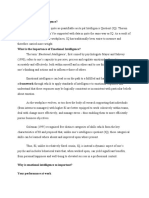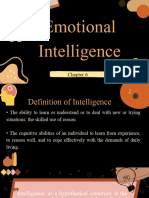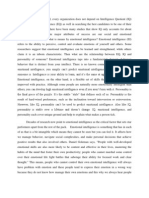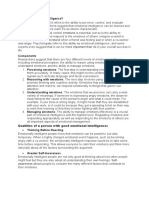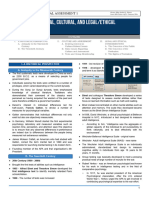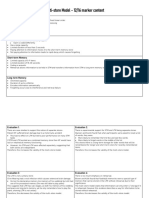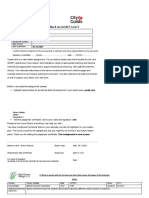13 Lecture
Uploaded by
smatovamoldir613 Lecture
Uploaded by
smatovamoldir6Emotional intelligence and social roles
The basic rules for expressing and experiencing emotions in different
cultures.The role of emotions in human life. Understanding of emotions
and empathy. Methods and mechanisms for regulating emotions:
rethinking emotions and suppressing emotions. Definition of emotional
intelligence. Emotional intelligence as cognitive ability and as an
individual characteristic of a person. Diagnosis and development of
emotional intelligence.
What is the role of social and emotional intelligence?
Social + Emotional Intelligence is the ability to be aware of our own
emotions and those of others, in the moment, and to use that information
to manager ourselves and our relationships effectively – even in
challenging situations.
Social intelligence
As the name suggests, social intelligence is more visible in social
surroundings. In fact, there are several critical traits to recognize people
with high social intelligence.
First and foremost, socially intelligent people are able to conduct
conversations with various people, and verbally communicate with
appropriate and tactful words.
Therefore, they can adapt easily to different social roles, while they
perfectly understand the informal rules of the game that are the essence
of social interaction.
Of course, these characteristics make them excellent listeners. Socially
intelligent people have developed an ability to efficiently analyze what
triggers people by paying attention to what they are saying and how they
are behaving.
By combining these three aspects, people with high social intelligence
not only do they know how to play different
social roles, but they do so in order to feel comfortable with many
different types of personalities.
Such a skill is crucial onboard a ship, which houses a vast array of
people over the course of some months. Different nationalities,
countries, ages and genders mean different cultures and behaviours.
All these people must preserve a proper communication between them
so as to get the job done, but also live with each other without problems.
Practicing and training your social intelligence, will prepare you to deal
with different types of people, and be able to understand your
surroundings, in order to feel comfortable.
Emotional intelligence
In contrast to social intelligence, emotional intelligence is the ability to
identify and manage our own emotions and the emotions of others. This
type of intelligence includes three key traits:
1. Emotional awareness
2. Applying emotions to processes
3. Emotion management.
As a matter of fact, companies now give a great deal of emphasis to this
kind of intelligence. By asking questions such as “how do you handle
tough questions?”, and “can you stay focused?”, the goal is to see how a
person handles emotions in a constantly-changing, fast-paced
environment.
And a ship is such an environment. Constantly being aware for
imminent dangers in the sea, mechanical problems and of course
damaged psychology due to the separation from one’s family and
friends, can apply a great deal of pressure to seafarers.
Being emotionally intelligent, will at first give the seafarer the ability to
know why they are feeling what they are feeling, and in a second stage it
will provide the tools to be resilient and find solutions to the problems
that come up.
Social and emotional intelligence = ESI
Despite their differences, social and emotional intelligence combine to
form ESI. ESI competencies are “linked to self-awareness, self-
management and relationship management, which enable people to
understand and manage their own and others’ emotions in social
interactions.”
Social intelligence develops from experience with people and learning
from success and failures in social settings. It is more commonly
referred to as “tact,” “common sense,” or “street smarts.”
This is one definition, but what does it mean? As we said, IQ by itself is
not enough to determine who is smarter, or a better leader. ESI comes to
fill this gap, by indicating those people that pose all three aspects of
intelligence. Being ‘’book smart’’ and ‘’street smart’’ is a necessity at
today’s society.
And while IQ may be difficult to change – if not possible at all – ESI
can be learned and improved during a person’s whole life course.
Social vs emotional intelligence
Both intelligences are important for advancing innovation. However,
there are certain aspects during our life, where one or the other is more
beneficial.
We could say that social intelligence focuses more on the future. It can
be considered as primal survival instinct, where people must find ways
to coexist with someone, and find benefits from every situation.
Once again, IQ is very important, but we are surrounded by people
daily. If we do not have a proper social intelligence, we will develop
stranded relationships, based on improper foundations.
On the other hand, emotional intelligence is more about the present.
Emotional intelligence relates to our and others’ emotions and feelings.
If you can read someone’s face and be able to tell if they are happy, sad
or nervous, then this is an indication that you have developed a proper
level of emotional intelligence.
Of course emotional intelligence applies to our feelings as well. By
knowing why we are feeling what we are feeling, it gives us a great deal
of self-awareness, which in turn gives us full control of ourselves.
Having a high level of emotional intelligence allows you to empathize
with others, communicate effectively, and be both self and socially
aware. How we respond to ourselves and others impacts our home and
work environments. Living in this world means interacting with many
different types of people, as well as constant change and surprises.
Being emotionally intelligent is key to how you respond to what life
gives us. It’s also a key component of compassion and understanding the
deeper reasons behind other people's actions.
EI is especially important when you are dealing with stressful situations
like conflict, change, and obstacles. During these times, it's critical to
remember to practice kindness, and being in touch with our emotions
can help us do just that.
The Five Components of Emotional Intelligence
Goleman laid out five components that are critical for emotional
intelligence.
Self-Awareness. The ability to recognize what you’re feeling and
also understanding how your emotions and actions can affect
others.
Self-Regulation. Being able to regulate and manage the emotions
you’re feeling while waiting for the appropriate time and avenue in
how to express them.
Motivation. Emotionally intelligent people are motivated by
things beyond money, fame, or success. They’re also able to
understand and desire the need to fulfill their own inner needs and
goals.
Empathy. Having a high EQ means being able to understand what
others may be feeling and are going through and responding kindly
and thoughtfully.
Social Skills. Social skills are vital to emotional intelligence.
When you’re aware of how you’re feeling, what others are feeling,
and able to communicate effectively, you’re ready to interact well
with others.
Understanding and putting these components into action thoughtfully
and intentionally can make a drastic difference in not just your life, but
those around you. It will help you become more empathetic towards
other people and more aware of your social surroundings.
Emotional intelligence (EI) has become one of the new management
'buzz' terms. It is suggested that this is the missing ingredient that
separates average from top management or performance. However,
despite its potential relevance for social work practice, there has been
little investigation and few reports about its application in social work
settings. This paper seeks to stimulate debate about the role of EI in
social work practice by considering its development, definitions and
problematics. Whilst the empirical evidence supporting the existence of
a separate and measurable EI is ambiguous and emergent, the role of
emotion in the organization of human behaviour is more firmly
established. The paper examines the role of EI and emotion in relation to
five core social work tasks: engagement of users; assessment and
observation; decision making; collaboration and co-operation; dealing
with stress. The paper situates itself in the rapidly changing context of
social work: the merger of social services departments with larger more
powerful bureaucracies; the movement towards integrated service
delivery; and the new social work degree. It is argued that social work
needs to identify its claims to professional competence at a time of such
change, one of which is the ability to use relationships to address users'
needs. This requires the capacity to handle both one's own and others'
emotions effectively.
What Is Emotional Intelligence and Its Importance
By Nikita Duggal
Last updated on Jan 20, 2023134527
What is Emotional Intelligence and Its Importance
Table of Contents
Why is Emotional Intelligence ImportantWhat is Emotional
Intelligence?Seven Components of Emotional IntelligenceHow
Emotional Intelligence is Measured?Emotional Intelligence - The
Ability to Perceive, Evaluate, Express and Control EmotionsView More
An interesting thing is happening in the 21st-century workplace: The
more technology we have in this digital age, the more we automate tasks
and trust machines to take over duties, and the more we realize the
importance of emotions; more specifically, the more we recognize the
importance of emotional intelligence.
Emotional intelligence is our ability to recognize emotions in ourselves
and others, to understand their effects, and to use that knowledge to
guide our thoughts and behaviors. Because emotionally intelligent
people tend to get along better with others and be more empathetic and
compassionate, they are likely to be more successful compared to their
counterparts. And that makes emotional intelligence something worth
learning more about.
Here's How to Land a Top Software Developer Job
Full Stack Development-MEANEXPLORE PROGRAMHere's How to
Land a Top Software Developer Job
Why is Emotional Intelligence Important
Emotional intelligence can assist you in building stronger relationships,
achieving success at school and work, and achieving your career and
personal goals. Also, it can help you connect with your feelings, act on
your intentions, and make informed decisions regarding your personal
goals.
What is Emotional Intelligence?
Emotional intelligence (EQ) is the ability to understand, use, and
manage your feelings for the purpose of reducing stress, communicating
effectively with others, empathizing with them, and overcoming
challenges.
If emotional intelligence sounds like an oxymoron to you, that’s
understandable. We tend to think of our emotions and our intelligence as
two separate things. But put them together as emotional intelligence, and
it’s essentially a different way to be smart because it’s “the capacity to
be aware of, control, and express one's emotions, and to handle
interpersonal relationships judiciously and empathetically” according to
the dictionary definition. The term was made popular by psychologist
Daniel Goleman in his book Emotional Intelligence: Why It Can Matter
More Than IQ, in which he redefines what it is to be smart. In the book,
Goleman lays out seven components of emotional intelligence.
Seven Components of Emotional Intelligence
Self-awareness
When we’re self-aware, we know our strengths and weaknesses, as well
as how we react to situations and people. This information can help us to
set boundaries and manage our interactions with others in a way that is
authentic to us. Additionally, when we know ourselves well, we can be
more effective communicators since we are able to better understand the
other person and what they might be looking for in a conversation.
Finally, by being self-aware, we can work on improving ourselves and
our lives in ways that are meaningful to us.
Self-management
Self-management is the process of taking charge of one's life and
making decisions that affect oneself. It is about being proactive and
responsible for one's own well-being. Self-management involves setting
goals, taking action to achieve those goals, and monitoring progress
along the way. It also means being flexible and adaptable, adjusting
plans as needed to reach one's goals.
Self-regulation
Because they are self-aware, emotionally intelligent people can regulate
their emotions and keep them in check as necessary.
Motivation
People with high emotional intelligence tend to be highly motivated as
well, which makes them more resilient and optimistic. They find ways to
enjoy life even during difficult times, and they're always looking for
ways to improve themselves. This makes them more successful in all
areas of their lives.
Empathy
People with empathy and compassion are simply better at connecting
with other people. They have the ability to see things from other
people’s perspectives, and this enables them to build relationships that
are based on mutual understanding and respect. People with empathy
and compassion can also easily relate to other people’s emotions, which
makes them better at providing support and comfort. Lastly, people with
empathy and compassion tend to be more altruistic, and they are more
likely to go out of their way to help others. All of these qualities make
people with empathy and compassion some of the most valuable
members of any community.
Social Skills
The social skills of emotionally intelligent people show they genuinely
care for and respect others and they get along well with them.
Relationship Management
Relationship management is the process of building and maintaining
positive relationships with customers, clients, partners, and others who
can help the organization achieve its goals. Effective relationship
management can result in increased sales, improved customer loyalty,
and higher levels of customer satisfaction.
Craft a Magnetic General Management Resume
Free Webinar | 5 October, Thursday | 9 PM ISTREGISTER NOWCraft a
Magnetic General Management Resume
How Emotional Intelligence is Measured?
Emotional Intelligence is the best proven world-class scenario and it
makes it possible to witness how candidates interact with others in the
initial meeting. Additionally, every interaction ought to be the same for
the evaluation to be fair to everyone. And that is also not practical.
That's where the latest, sophisticated Emotional Intelligence tests come
in. Self-reporting, other-reporting, and ability testing are the three
widely used measuring methods of Emotional Intelligence (EI).
Self-reporting - It is something similar to the personality test that mostly
all humans do. This methodology is useful for determining how
candidates view themselves, but it has some drawbacks. A reliable
method for assessing innate characteristics like those found in
personality tests is self-report testing. Self-reporting would be a reliable
indicator of Emotional Intelligence, but only in people who already have
high Emotional Intelligence.
Other-reposting skill - It is the assessment of the Emotional Intelligence
of a person based on the report of the EI of another person. This also
known as observer rating is most useful to measure how someone
manages their emotions compared to people around them. Another
report provides useful information about how others perceive someone,
but it is not the best way to assess Emotional Intelligence. After all, to
obtain truly reliable results from other reporting, all observers must have
high EI themselves. Otherwise, this methodology risks introducing bias
into the evaluation process.
Ability testing - Ability testing is the most dependable type of testing for
EI testing. It may initially seem impossible to precisely measure and
assess a person's level of Emotional Intelligence. It's a common
misconception that anything related to feelings or emotions lacks a
scientific or logical foundation, but this couldn't be further from the
truth. You wouldn't ask a candidate how fast they type, nor would you
inquire of their friends or coworkers, if you wanted to assess a
candidate's typing abilities. Just give them a typing test to take. The
various crucial components of an effective EI ability test will highlight
the test-capacity taker's ability to identify, understand, and use emotion.
Emotional Intelligence - The Ability to Perceive, Evaluate, Express and
Control Emotions
Emotional Intelligence is the way of positively managing emotions to
relieve stress and involves the ability to use and understand emotions.
Additionally, it includes a positive way of effectively communicating,
and empathizing with others and helps to create strong relationships at
the office, school, and college. It also enables you to take instant and
informed decisions that appeal to and impact your emotions.
Signs of Emotional Intelligence
Here we are listing a few signs that indicate you are Emotionally
Intelligent:
You seem to have high Emotional Intelligence if you can empathize
with others, collaborate with others, and read and regulate emotions.
If you have Emotional Intelligence, you can address conflict, concerns,
and needs in a much calmer, straightforward manner, which will
improve your communication and relationships with others, whether
professional or personal.
Being able to recognize that someone is struggling, excited, angry, or
going through any emotions, and supporting them and trying to give
them what they need, demonstrates that you are very Emotionally
Intelligent.
Closed-ended questions can be answered in a single word, whereas
open-ended questions must be highlighted. Asking open-ended questions
can indicate that you have higher Emotional Intelligence as it indicates
that you are eager to learn.
Having good social skills and setting boundaries when communicating
assertively shows you are Emotionally Intelligent.
What is the Difference Between IQ and EQ?
If emotional intelligence is a type of intelligence, how does it differ from
the mental type? In part, by how it’s measured. One’s intelligence
quotient (IQ) is a score derived from standardized tests designed to
measure intelligence. Your IQ relates directly to your intellectual
abilities, like how well you learn as well as understand and apply
information. People with higher IQs can think abstractly and make
mental connections more easily.
Emotional intelligence is very different. Sometimes called EI (for
Emotional Intelligence) or EQ (for Emotional Intelligence Quotient),
emotional intelligence is like using emotions to think and enhance our
reasoning. Those with high emotional intelligence are able to manage
their emotions as well as use their emotions to facilitate their thinking
and understand the emotions of others.
When it comes to the workplace, some say emotional intelligence is
more beneficial for your career than IQ, although others argue IQ
matters more. Regardless of which is more important, emotional
intelligence plays a decidedly important role at work.
Importance of Emotional Intelligence
Just because you walk through the door and into an office building does
not mean you check your emotions at that door before starting work,
although it used to seem that way. In reality, emotions have always been
in the workplace, but they were to be kept in check, with people
pretending not to feel while they were on the clock.
These days, however, we are allowing emotions at work and recognizing
the benefits of doing so. And emotional intelligence matters more than it
used to because the workplace has changed. Today we work largely in
teams, not isolation, for one thing, and savvy companies are realizing
that recognizing emotions can exist lead to healthier environments. This
doesn’t mean it’s an emotional free-for-all by any means, but it does
mean people are more likely to be aware of their own and others’
emotions and act accordingly. People with higher emotional intelligence
are also more adaptable to change—a must in our fast-changing digital
age.
In addition, leaders with higher emotional intelligence tend to have
happier employees who then stay longer, reducing the costs of attrition,
and try harder, increasing productivity. An article from SuperOffice cites
examples of salespeople with higher emotional intelligence significantly
outperforming other salespeople and states that in a study of 515
executives, emotional intelligence was a higher predictor of success than
experience or IQ.
Companies that are hiring want to make sure they choose job candidates
who will mesh well with existing teams. As a result, about 71 percent of
organizations are now valuing emotional intelligence in an employee
over IQ. Even the smartest person needs good people skills to succeed
these days. A high IQ alone is no longer enough.
Emotional Intelligence Skills
A high IQ is also something we tend to be born with while emotional
intelligence is something we can work to improve. To a large degree,
our emotional intelligence starts in childhood with how we’re raised, but
as adults, we can take steps to get emotionally “smarter.” Justin Bariso,
author of EQ, Applied: A Real-World Approach to Emotional
Intelligence, offers seven ways to improve emotional intelligence in an
article written for Inc:
Reflect on your emotions. This is where self-awareness begins. To grow
in emotional intelligence, think about your own emotions and how you
typically react to negative situations, whether they involve a co-worker,
family member or stranger. When you’re more aware of your emotions
and typical reactions, you can start to control them.
Ask for perspective. What we perceive to be reality is often quite
different from what those around us are seeing. Start getting input from
others to understand how you come across in emotionally charged
situations.
Observe. Once you’ve increased your self-awareness and you
understand how you’re coming across, pay more attention to your
emotions.
Pause for a moment. Stop and think before you act or speak. It’s hard to
do, but keep working at it and it will become a habit.
Become more empathetic by understanding the “why.” Try to
understand the “why” behind another person’s feelings or emotions.
Choose to learn from criticism. Who likes criticism? Possibly no one.
But it’s inevitable. When we choose to learn from criticism rather than
simply defend our behaviors, we can grow in emotional intelligence.
Practice, practice, practice. Becoming more emotionally intelligent
won’t happen overnight, but it can happen—with effort, patience, and a
lot of practice.
Impact of Emotional Intelligence
Thinking Before Reacting
It is essential to think before you react in certain situations. Instant
reactions may be sometimes rigorous and the words used may create a
long-lasting impact on others' emotions. Hence, it is very important to
think before reacting in any situation, and communicating softly and
understandably will help to solve issues more easily and wisely.
Greater Self-Awareness
Greater self-awareness is a symbol of EI. People with high EI are always
self-aware and more conscious. Even though they are social, they set
boundaries in certain things. Additionally, stress management is only the
first step toward developing Emotional Intelligence. According to the
science of attachment, your current emotional experience is most likely a
reflection of your early life experiences. Your ability to manage core
emotions such as anger, sadness, fear, and joy is frequently influenced
by the consistency and quality of your early emotional experiences. If
your primary caregiver understood and valued your emotions as an
infant, your emotions have likely become valuable assets in adulthood.
Empathy for Others
Maintaining good social skills is another impact of Emotional
Intelligence especially when others are mentally weak. Once you have
emotional awareness, you can effectively develop additional
social/emotional skills that will improve the effectiveness, fruitfulness,
and fulfillment of your relationships. In human relationships, conflict
and disagreement are unavoidable. Two people can never have the same
needs, opinions, or expectations at the same time. Even though conflict
is not that bad, healthy and constructive conflict resolution is necessary
to build a relationship between two people. Conflict fosters freedom,
creativity, and safety in relationships when it is not perceived as
threatening or punishing.
How to Use Emotional Intelligence?
People with high Emotional Intelligence can support others in weak
times. You can boost your social skills by actively listening to others,
paying attention to non-verbal communication, and giving effective
solutions to their issues.
Tips for Improving EI
Listen - Active listening is very important in building a relationship.
Everyone loves to have a person who actively listens to their words and
creates positive and healthy conversations. Including some jokes, and
solutions can make magic in any relationship.
Empathize - Empathy is the ability to understand others' feelings and
also understand the set of feelings, desires, triggers, and fears.
Communicating and understanding others' feelings is fuel for Emotional
Intelligence.
Reflect - In Emotional Intelligence being social is very important and a
person with high Emotional Intelligence can be a good motivator. Try to
reflect on the socializing skills of great personalities and implement their
strategies in your life for motivating others.
History of Emotional Intelligence
Early Growth - In 1930, Edward Thorndike, a famous Psychologist
defined “Social Intelligence” as the ability to get along with others
healthily and positively. Later in 1940, Psychologist David Wechsler
described that different effective elements of intelligence can determine
how successful a person can be.
Later Developments - 1950’s witnessed the growth of a school of
thinkers and great thinkers including Abraham Maslow focussed on
different strategies to boost the emotional strength of people. A notion of
Multiple Intelligence was put forward in 1970 by Howard Gardner
which introduced the idea that intelligence was more just than a single,
general ability.
Emergence of Emotional Intelligence - The term “Emotional
Intelligence” was first used by Wayne Payne in a Doctoral Dissertation.
In 1990, Psychologist Peter Salovey and John Mayer published an
influential article in the journal “Imagination, Cognition, and
Personality”.
FAQs
1. How self-aware is an Emotionally Intelligent person?
Emotionally Intelligent people are highly conscious of their different
emotions and are capable of managing them effectively including
frustrations and stress. They can easily name their emotions and also
have great self-confidence and are realistic about self-awareness.
2. Do the Emotionally Intelligent have a better handle on self-
regulation?
An Emotionally Intelligent person thinks before any actions or talk and
can easily shift gears and lighten moods internally and externally. They
are never impulsive and don’t take instant or hasty actions.
3. Are the Emotionally Intelligent tuned into the emotions of others?
Emotionally Intelligent people always tune into the emotions of others.
Such persons can be good friends, partners, parents, or leaders.
4. Are the Emotionally Intelligent more empathic?
They have high empathizing skills and can help them resolve their
issues. Moreover, they are very supportive and tune their moods
according to the emotions of the people.
5. Is Emotional Intelligence a valid construct?
This notion is actually in debate in this field and some Psychologists
argue that it can be charisma and parsimoniously described by traits
such as agreeableness.
6. Can I learn to be more Emotionally Intelligent?
Yes, you can learn to be more Emotionally Intelligent by investing time
to judge your emotions and actions.
7. Are Emotionally Intelligent higher performers in the workplace?
Some Emotionally Intelligent people are good at their workplace but
some are not. Hence, the correlation between the workplace performance
and Emotional Intelligence is immeasurable.
8. Are the Emotionally Intelligent more motivated?
Yes, they are more motivated in managing tasks and problem solving
and also good at motivating others.
9. Can you test for Emotional Intelligence in the workplace?
It is noticed that some employers test the Emotional Intelligence of
candidates during recruitment. But there is no report regarding how
effective it is in the work locations.
10. Can Emotional Intelligence be measured?
It is impossible since there is no validated psychometric test or scale for
Emotional Intelligence. Moreover, some argue that it is an interpersonal
skill and not an actual construct.
How do you improve emotional intelligence?
There's excellent news. The way we respond to ourselves and others can
be improved. All of us can work toward being more confident, positive,
and kind. Here are a few ways:
Pay attention to yourself. Notice how people respond when you
speak. Notice how you react when others speak. Do you rush to
judgment? Does your facial express or body language say one
thing while your words (or lack of words) express something
different? Easy improvements can be made simply by noticing our
go-to negative words, expressions, and feelings and making
adjustments.
Use positive language. What we say impacts our thoughts and
actions, as well as the feelings of other people. Take charge of
your environment by focusing on the positive and using words that
move yourself and others forward.
Keep going. Recognize that everyone has temporary setbacks and
struggles. Look for a change in direction to keep going or find
energy in a new path.
Watch your stress level. When things are a bit crazy, negative
emotions can rise to the surface much faster and can be harder to
control. Make sure to find time to relax; take a break, and do an
activity you enjoy or spend 10 minutes taking deep, refreshing
breaths.
Show compassion. We've said it before, and we'll say it again.
Kindness takes practice. Look for ways to show compassion and
empathy to others, even when you feel they don't deserve it. And if
you need to ask for forgiveness, do it.
Being emotionally intelligent will make a positive difference in your
relationships with friends and coworkers as well as in your personal life.
Other EI Resources:
Daniel Goleman Introduces Emotional Intelligence
Emotional Intelligence Quiz
50 tips for improving your emotional intelligence
“We cannot tell what may happen to us in the strange medley of life. But
we can decide what happens in us — how we can take it, what we do
with it —- and that is what really counts in the end.” — Joseph Fort
Newton
The ROI of Kindness
Ever wonder if there’s an ROI of Kindness? We say…yes! Learn helpful
nuggets like the one below, plus how to create a Kindness Value
Proposition (KVP) at your organization in this simple book by Inspire
Kindness founder Mac Anderson and Brian Biro, The ROI of Kindness.
Fact: Turnover reduction/employee retention…The average annual
turnover in the Quick Service Food Industry is 170%. The two
companies that constantly focus on kindness as the “magic” ingredient
more than any other in their cultures average 14% and 24% annual
turnover. In other words, these two companies retain their employees 8
to 10 times more than their competitors.
Create a program for the development of emotional intelligence.
You might also like
- Assignment On Emotional Intelligence Vidhyta (H24blau0008) FinallNo ratings yetAssignment On Emotional Intelligence Vidhyta (H24blau0008) Finall5 pages
- Emotional Intelligence Additional Reading MaterialNo ratings yetEmotional Intelligence Additional Reading Material9 pages
- FALLSEM2024-25 BHUM203L TH VL2024250106841 2024-10-07 Reference-Material-INo ratings yetFALLSEM2024-25 BHUM203L TH VL2024250106841 2024-10-07 Reference-Material-I13 pages
- Increase Your EQ Increase Y - (Z-Library)No ratings yetIncrease Your EQ Increase Y - (Z-Library)105 pages
- Name Rahmatullah Roll No 2k20/BBA/138 ASSIGNMENT EMOTIONS and Emotional IntelligenceNo ratings yetName Rahmatullah Roll No 2k20/BBA/138 ASSIGNMENT EMOTIONS and Emotional Intelligence15 pages
- Introduction To Project: 1.1 Concept and SignificanceNo ratings yetIntroduction To Project: 1.1 Concept and Significance15 pages
- Factors Contributing To The Emotional Intelligence100% (1)Factors Contributing To The Emotional Intelligence15 pages
- Literature View: Emotional Intelligence: Emotions Might Even Be More Important Than IQNo ratings yetLiterature View: Emotional Intelligence: Emotions Might Even Be More Important Than IQ13 pages
- The Importance of Emotional Intelligence in Personal and Professional SuccessNo ratings yetThe Importance of Emotional Intelligence in Personal and Professional Success3 pages
- Emotional Intelligence: - by Ravikeerthi RaoNo ratings yetEmotional Intelligence: - by Ravikeerthi Rao38 pages
- Unit I Introduction To Emotional Intelligence-FINAL100% (1)Unit I Introduction To Emotional Intelligence-FINAL26 pages
- Psychological Description of The Concept of Emotional IntelligenceNo ratings yetPsychological Description of The Concept of Emotional Intelligence5 pages
- Emotional Intelligence: Understanding Its Definition, Development, and Impact100% (1)Emotional Intelligence: Understanding Its Definition, Development, and Impact16 pages
- Emotions: What Is Emotional Intelligence?No ratings yetEmotions: What Is Emotional Intelligence?3 pages
- EMOTIONAL INTELLIGENCE IN THE WORKPLACE RealNo ratings yetEMOTIONAL INTELLIGENCE IN THE WORKPLACE Real40 pages
- Role of Emotional Intelligence in Managing Stress Among Employees at WorkplaceNo ratings yetRole of Emotional Intelligence in Managing Stress Among Employees at Workplace27 pages
- Chapter 1 Understanding Curriculum, Different Types of Curriculum, Curriculum Foundation, Curriculum Conception, Elements of CurriculumNo ratings yetChapter 1 Understanding Curriculum, Different Types of Curriculum, Curriculum Foundation, Curriculum Conception, Elements of Curriculum19 pages
- Historical and Cultural Aspects of Psychological AssessmentNo ratings yetHistorical and Cultural Aspects of Psychological Assessment4 pages
- His Excellency Sukavich Rangsitpol's. Teacher Learning in Changing WorldNo ratings yetHis Excellency Sukavich Rangsitpol's. Teacher Learning in Changing World8 pages
- A-Importance of Play As An Essential and Fundamental Approach To Teaching and LearningNo ratings yetA-Importance of Play As An Essential and Fundamental Approach To Teaching and Learning20 pages
- Module 4 - Teaching P.E & Health in Elementary GradesNo ratings yetModule 4 - Teaching P.E & Health in Elementary Grades9 pages
- Urban Design: Behavioral/Perceptual ApproachNo ratings yetUrban Design: Behavioral/Perceptual Approach83 pages
- Time Constraints (Authentic Asssessment)No ratings yetTime Constraints (Authentic Asssessment)4 pages
- Unit 33. Working With Individual LearnersNo ratings yetUnit 33. Working With Individual Learners16 pages
- Multi-Store Model - 12-16 Marker ContentNo ratings yetMulti-Store Model - 12-16 Marker Content2 pages







